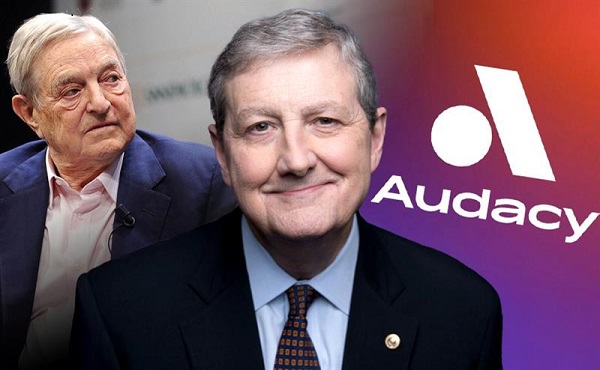Business
Sen. John Kennedy slams FCC over hurried approval of Soros massive radio station takeover

From LifeSiteNews
U.S. Sen. John Kennedy took to the Senate floor Tuesday to renew questions about the Biden Federal Communications Commission’s approval of a deal for far-left activist financier George Soros to acquire more than 200 stations at once
Republican U.S. Sen. John Kennedy of Louisiana took to the Senate floor Tuesday to renew questions about the Biden Federal Communications Commission’s (FCC’s) approval of a deal for far-left activist financier George Soros to acquire more than 200 stations at once, declaring something “weird” expedited the review.
In February 2024, Soros purchased $400 million of debt for Audacy, the second largest radio station owner (behind iHeartMedia) in the nation. Soros invested in the company after it filed for bankruptcy the month before with nearly $2 billion in debts. The investment comes with a yield of 50 cents on the dollar after the company emerges from bankruptcy, pending approval by a bankruptcy court of the company’s restructuring plan. Audacy stations carry the top names in conservative punditry, including Sean Hannity, Dana Loesch, Ben Shapiro, Mark Levin, Glenn Beck, and Erick Erickson.
In September, FCC Commissioner Brendan Carr testified before the House Oversight Committee that “the FCC is not following its normal process for reviewing transactions that it has established over a number of years. It seems to me the FCC is poised, for the first time, to create an entirely new shortcut.”
The New York Post added at the time that Carr told them “the Democrats in FCC leadership cut a secret, backroom deal – one that kept the Republican FCC Commissioners and perhaps others completely in the dark – and then hustled it out the door on a Friday afternoon” in a 3-2 party-line vote. The FCC approved the deal in October, with congressional Republicans vowing to investigate.
Speaking on the Senate floor, Kennedy began by recalling former President Joe Biden’s Farewell Address warning that “an oligarchy is taking shape in America of extreme wealth, power, and influence that literally threatens our entire democracy, our basic rights and freedoms, and a fair shot for everyone to get ahead.”
Kennedy said he did not know which “oligarchs” Biden had in mind, but that Soros fit the description. He went on to detail how Soros took advantage of Audacy filing for Chapter 11 bankruptcy and became the majority shareholder, which triggered an FCC review process.
Approval of the deal, he said in his trademark style, “went through the FCC like green grass through a goose,” and Democrat commissioners “short-circuited” the normal review process.
“I’m not an FCC expert. I’m not a communications law expert,” Kennedy said. “But I’ve read, this has been widely reported and I’ve read about it in many reports. Normally on a deal of this size, when 220 radio stations are being transferred, their licenses, using airwaves that belong to the American people, and there’s a substantial percentage of foreign owners, it would take about a year to get through the FCC. FCC would do a complete investigation. Not this time! Noooo. This time was special.”
“Pass me the sick bucket,” Kennedy said after reviewing past commentary by Carr and others about the deal. “This isn’t right! But they did it. Now, this is America. You’re entitled to believe what you want. If it’s legal, you’re entitled to do what you want. And Mr. Soros is certainly entitled to his opinion. He is. I don’t agree with him, but he is certainly entitled to it in America. I’m not much into this cancel culture. And hopefully we’ve seen the end of it.”
“But when you’re acquiring radio licenses which can influence public opinion, and you’re doing it in part, not exclusively but in part, with foreign money, well, that’s why we have the FCC,” he went on. “They’re entitled to their opinion, but my people in Louisiana are entitled to know whose opinion they’re hearing on the radio. And this has not been reported once in Louisiana.”
“I am not saying it wasn’t done legally,” Kennedy concluded. “I am saying it looks funny. Not funny ha-ha. It looks weird the way this was done. It has the aroma of politics. And I hope the new FCC revisits this issue.”
Soros’ takeover of so many stations is alarming as the latest display of his willingness to use his vast wealth to influence American politics. A small sampling of the causes the billionaire has financed includes promoting legal abortion-on-demand worldwide under the guise of “reproductive health care;” supporting the election of district attorneys friendly to his politics in localities across the United States; pushing a “racial justice” agenda, including the narrative that America is systemically racist and promoting policies such as reparations for slavery; subsidizing “fact-checking” enterprises that attempt to discredit conservative media outlets under false pretenses, and funding Democrat political candidates.
In 2023, local news outlet Maine Public reported that the Soros-backed National Trust had gained control of Maine’s largest network of newspapers, acquiring five daily papers and 17 weekly publications. The National Trust received funding from Soros’ Open Society Foundation and left-wing Swiss billionaire Hansjörg Wyss for the purchase of the media network.
Carr, who has since been appointed FCC chairman by President Donald Trump, is expected to investigate the deal.
Business
Canadians love Nordic-style social programs as long as someone else pays for them

This article supplied by Troy Media.
 By Pat Murphy
By Pat Murphy
Generous social programs come with trade-offs. Pretending otherwise is political fiction
Nordic societies fund their own benefits through taxes and cost-sharing. Canadians expect someone to foot the bill
Like Donald Trump, one of my favourite words starts with the letter “T.” But where Trump likes the word “tariff,” my choice is “trade-off.” Virtually everything in life is a trade-off, and we’d all be much better off if we instinctively understood that.
Think about it.
If you yield to the immediate pleasure of spending all your money on whatever catches your fancy, you’ll wind up broke. If you regularly enjoy drinking to excess, be prepared to pay the unpleasant price of hangovers and maybe worse. If you don’t bother to acquire some marketable skill or credential, don’t be surprised if your employment prospects are limited. If you succumb to the allure of fooling around, you may well lose your marriage. And so on.
Failing to understand trade-offs also extends into political life. Take, for instance, the current fashion for anti-capitalist democratic socialism. Pushed to explain their vision, proponents will often make reference to the Nordic countries. But they exhibit little or no understanding of how these societies actually work.
As American economist Deirdre Nansen McCloskey notes, “Sweden is pretty much as ‘capitalistic’ as is the United States. If ‘socialism’ means government ownership of the means of production, which is the classic definition, Sweden never qualified.” The central planning/government ownership model isn’t the Swedish way.
What the Nordics do have, however, is a robust social safety net. And it’s useful to look at how they pay for it.
J.P. Morgan’s Michael Cembalest is a man who knows his way around data. He puts it this way: “Copy the Nordic model if you like, but understand that it entails a lot of capitalism and pro-business policies, a lot of taxation on middle-class spending and wages, minimal reliance on corporate taxation and plenty of co-pays and deductibles in its health care system.”
For instance, take the kind of taxes that are often derided as undesirably regressive—sales taxes, social security taxes and payroll taxes. In Sweden, they account for a whopping 27 per cent of gross domestic product. And some 15 per cent of health expenditures are out of pocket.
Charles Lane—formerly with the Washington Post, now with The Free Press—is another who pulls no punches: “Nordic countries are generous, but they are not stupid. They understand there is no such thing as ‘free’ health care, and that requiring patients to have at least some skin in the game, in the form of cost-sharing, helps contain costs.”
In effect, Nordic societies have made an internal bargain. Ordinary people are prepared to fork over large chunks of their own money in return for a comprehensive social safety net. They’re not expecting the good stuff to come to them without a personal cost.
Scandinavians obviously understand the concept of trade-offs, a dimension that seems to be absent from much of the North American discussion. Instead of Nordic-style pragmatism, spending ideas on this side of the Atlantic are floated on the premise of having someone else pay. And the electorally prized middle class is to be protected at all costs.
In the aftermath of Zohran Mamdami’s New York City win, journalist Kevin Williamson had a sobering reality check: “Class warfare isn’t how they roll in Scandinavia. Oslo is a terrific place to be a billionaire—Copenhagen and Stockholm, too … what’s radically different about the Scandinavians is not how they tax the very high-income but how they tax the middle.”
Taxation propensities aside, Nordic societies are different from the United States and Canada.
Denmark, for instance, is very much a “high-trust” society, defined as a place “where interpersonal trust is relatively high and ethical values are strongly shared.” It’s often been said that it works the way it does because it’s full of Danes, which is broadly true—albeit less so than it was 40 years ago.
Denmark, though, has no interest in multiculturalism as we’ve come to know it. Although governed from the centre-left, there’s no state-sponsored focus on systemic discrimination or diversity representation. Instead, the emphasis is on social cohesion and conformity. If you want to create a society like Denmark, it helps to understand the dynamics that make it work.
Reality intrudes on all sorts of other issues. For example, there’s the way in which public discourse is disfigured on the question of climate change and the need to pursue aggressive net-zero policies.
Asked in the abstract, people are generally favourable, which is then touted as evidence of strong public support. But when subsequently asked how much they’re personally prepared to pay to accomplish these ambitious goals, the answer is often little or nothing.
If there’s one maxim we should be taught from childhood, it’s this: there are no panaceas, only trade-offs.
Troy Media columnist Pat Murphy casts a history buff’s eye at the goings-on in our world. Never cynical – well, perhaps a little bit.
Troy Media empowers Canadian community news outlets by providing independent, insightful analysis and commentary. Our mission is to support local media in helping Canadians stay informed and engaged by delivering reliable content that strengthens community connections and deepens understanding across the country.
Alberta
Alberta can’t fix its deficits with oil money: Lennie Kaplan

This article supplied by Troy Media.
Alberta is banking on oil to erase rising deficits, but the province’s budget can’t hold without major fiscal changes
Alberta is heading for a fiscal cliff, and no amount of oil revenue will save it this time.
The province is facing ballooning deficits, rising debt and an addiction to resource revenues that rise and fall with global markets. As Budget 2026 consultations begin, the government is gambling on oil prices to balance the books again. That gamble is failing. Alberta is already staring down multibillion-dollar shortfalls.
I estimate the province will run deficits of $7.7 billion in 2025-26, $8.8 billion in 2026-27 and $7.5 billion in 2027-28. If nothing changes, debt will climb from $85.2 billion to $112.3 billion in just three years. That is an increase of more than $27 billion, and it is entirely avoidable.
These numbers come from my latest fiscal analysis, completed at the end of October. I used conservative assumptions: oil prices at US$62 to US$67 per barrel over the next three years. Expenses are expected to keep growing faster than inflation and population. I also requested Alberta’s five-year internal fiscal projections through access to information but Treasury Board and Finance refused to release them. Those forecasts exist, but Albertans have not been allowed to see them.
Alberta has been running structural deficits for years, even during boom times. That is because it spends more than it brings in, counting on oil royalties to fill the gap. No other province leans this hard on non-renewable resource revenue. It is volatile. It is risky. And it is getting worse.
That is what makes Premier Danielle Smith’s recent Financial Post column so striking. She effectively admitted that any path to a balanced budget depends on doubling Alberta’s oil production by 2035. That is not a plan. It is a fantasy. It relies on global markets, pipeline expansions and long-term forecasts that rarely hold. It puts taxpayers on the hook for a commodity cycle the province does not control.
I have long supported Alberta’s oil and gas industry. But I will call out any government that leans on inflated projections to justify bad fiscal choices.
Just three years ago, Alberta needed oil at US$70 to balance the budget. Now it needs US$74 in 2025-26, US$76.35 in 2026-27 and US$77.50 in 2027-28. That bar keeps rising. A single US$1 drop in the oil price will soon cost Alberta $750 million a year. By the end of the decade, that figure could reach $1 billion. That is not a cushion. It is a cliff edge.
Even if the government had pulled in $13 billion per year in oil revenue over the last four years, it still would have run deficits. The real problem is spending. Since 2021, operating spending, excluding COVID-19 relief, has jumped by $15.5 billion, or 31 per cent. That is nearly eight per cent per year. For comparison, during the last four years under premiers Ed Stelmach and Alison Redford, spending went up 6.9 per cent annually.
This is not a revenue problem. It is a spending problem, papered over with oil booms. Pretending Alberta can keep expanding health care, education and social services on the back of unpredictable oil money is reckless. Do we really want our schools and hospitals held hostage to oil prices and OPEC?
The solution was laid out decades ago. Oil royalties should be saved off the top, not dumped into general revenue. That is what Premier Peter Lougheed understood when he created the Alberta Heritage Savings Trust Fund in 1976. It is what Premier Ralph Klein did when he cut spending and paid down debt in the 1990s. Alberta used to treat oil as a bonus. Now it treats it as a crutch.
With debt climbing and deficits baked in, Alberta is out of time. I have previously laid out detailed solutions. But here is where the government should start.
First, transparency. Albertans deserve a full three-year fiscal update by the end of November. That includes real numbers on revenue, expenses, debt and deficits. The government must also reinstate the legal requirement for a mid-year economic and fiscal report. No more hiding the ball.
Second, a real plan. Not projections based on hope, but a balanced three-year budget that can survive oil prices dropping below forecast. That plan should be part of Budget 2026 consultations.
Third, long-term discipline. Alberta needs a fiscal sustainability framework, backed by a public long-term report released before year-end.
Because if this government will not take responsibility, the next oil shock will.
Lennie Kaplan is a former senior manager in the fiscal and economic policy division of Alberta’s Ministry of Treasury Board and Finance, where, among other duties, he examined best practices in fiscal frameworks, program reviews and savings strategies for non-renewable resource revenues. In 2012, he won a Corporate Values Award in TB&F for his work on Alberta’s fiscal framework review. In 2019, Mr. Kaplan served as executive director to the MacKinnon Panel on Alberta’s finances—a government-appointed panel tasked with reviewing Alberta’s spending and recommending reforms.
-

 Alberta2 days ago
Alberta2 days agoIEA peak-oil reversal gives Alberta long-term leverage
-

 Bruce Dowbiggin2 days ago
Bruce Dowbiggin2 days agoHealthcare And Pipelines Are The Front Lines of Canada’s Struggle To Stay United
-

 Alberta2 days ago
Alberta2 days agoAlberta can’t fix its deficits with oil money: Lennie Kaplan
-

 Business2 days ago
Business2 days agoCanadians love Nordic-style social programs as long as someone else pays for them
-

 International2 days ago
International2 days agoTrump vows to pause migration after D.C. shooting
-

 Daily Caller2 days ago
Daily Caller2 days ago‘No Critical Thinking’: Parents Sound Alarm As Tech Begins To ‘Replace The Teacher’
-

 National1 day ago
National1 day agoAlleged Liberal vote-buying scandal lays bare election vulnerabilities Canada refuses to fix
-

 Addictions1 day ago
Addictions1 day agoThe Death We Manage, the Life We Forget









